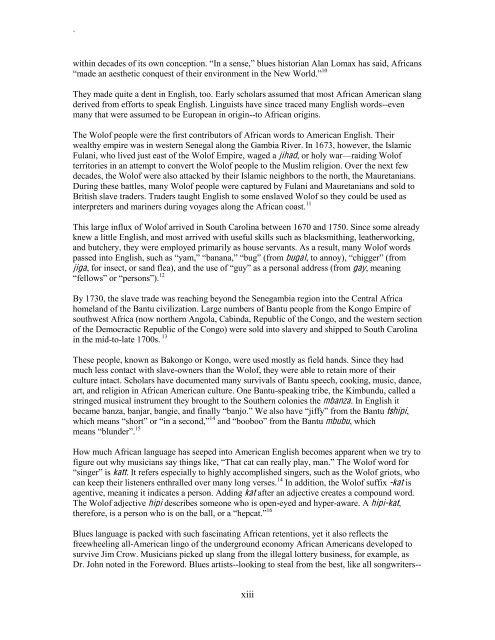Language of the Blues - Edmonton Blues Society
Language of the Blues - Edmonton Blues Society
Language of the Blues - Edmonton Blues Society
You also want an ePaper? Increase the reach of your titles
YUMPU automatically turns print PDFs into web optimized ePapers that Google loves.
`<br />
<br />
10<br />
<br />
They made quite a dent in English, too. Early scholars assumed that most African American slang<br />
derived from efforts to speak English. Linguists have since traced many English words--even<br />
many that were assumed to be European in origin--to African origins.<br />
The Wol<strong>of</strong> people were <strong>the</strong> first contributors <strong>of</strong> African words to American English. Their<br />
wealthy empire was in western Senegal along <strong>the</strong> Gambia River. In 1673, however, <strong>the</strong> Islamic<br />
Fulani, who lived just east <strong>of</strong> <strong>the</strong> Wol<strong>of</strong> Empire, waged a jihad, or holy war raiding Wol<strong>of</strong><br />
territories in an attempt to convert <strong>the</strong> Wol<strong>of</strong> people to <strong>the</strong> Muslim religion. Over <strong>the</strong> next few<br />
decades, <strong>the</strong> Wol<strong>of</strong> were also attacked by <strong>the</strong>ir Islamic neighbors to <strong>the</strong> north, <strong>the</strong> Mauretanians.<br />
During <strong>the</strong>se battles, many Wol<strong>of</strong> people were captured by Fulani and Mauretanians and sold to<br />
British slave traders. Traders taught English to some enslaved Wol<strong>of</strong> so <strong>the</strong>y could be used as<br />
interpreters and mariners during voyages along <strong>the</strong> African coast. 11<br />
This large influx <strong>of</strong> Wol<strong>of</strong> arrived in South Carolina between 1670 and 1750. Since some already<br />
knew a little English, and most arrived with useful skills such as blacksmithing, lea<strong>the</strong>rworking,<br />
and butchery, <strong>the</strong>y were employed primarily as house servants. As a result, many Wol<strong>of</strong> words<br />
<br />
bugal<br />
jiga<br />
gay, meaning<br />
12<br />
<br />
By 1730, <strong>the</strong> slave trade was reaching beyond <strong>the</strong> Senegambia region into <strong>the</strong> Central Africa<br />
homeland <strong>of</strong> <strong>the</strong> Bantu civilization. Large numbers <strong>of</strong> Bantu people from <strong>the</strong> Kongo Empire <strong>of</strong><br />
southwest Africa (now nor<strong>the</strong>rn Angola, Cabinda, Republic <strong>of</strong> <strong>the</strong> Congo, and <strong>the</strong> western section<br />
<strong>of</strong> <strong>the</strong> Democractic Republic <strong>of</strong> <strong>the</strong> Congo) were sold into slavery and shipped to South Carolina<br />
in <strong>the</strong> mid-to-late 1700s. 13<br />
These people, known as Bakongo or Kongo, were used mostly as field hands. Since <strong>the</strong>y had<br />
much less contact with slave-owners than <strong>the</strong> Wol<strong>of</strong>, <strong>the</strong>y were able to retain more <strong>of</strong> <strong>the</strong>ir<br />
culture intact. Scholars have documented many survivals <strong>of</strong> Bantu speech, cooking, music, dance,<br />
art, and religion in African American culture. One Bantu-speaking tribe, <strong>the</strong> Kimbundu, called a<br />
stringed musical instrument <strong>the</strong>y brought to <strong>the</strong> Sou<strong>the</strong>rn colonies <strong>the</strong> mbanza. In English it<br />
<br />
tshipi,<br />
14<br />
<br />
<br />
mbubu, which<br />
15<br />
<br />
How much African language has seeped into American English becomes apparent when we try to<br />
<br />
katt. It refers especially to highly accomplished singers, such as <strong>the</strong> Wol<strong>of</strong> griots, who<br />
can keep <strong>the</strong>ir listeners enthralled over many long verses. 14 In addition, <strong>the</strong> Wol<strong>of</strong> suffix -kat is<br />
agentive, meaning it indicates a person. Adding kat after an adjective creates a compound word.<br />
The Wol<strong>of</strong> adjective hipi describes someone who is open-eyed and hyper-aware. A hipi-kat,<br />
16<br />
<br />
<strong>Blues</strong> language is packed with such fascinating African retentions, yet it also reflects <strong>the</strong><br />
freewheeling all-American lingo <strong>of</strong> <strong>the</strong> underground economy African Americans developed to<br />
survive Jim Crow. Musicians picked up slang from <strong>the</strong> illegal lottery business, for example, as<br />
Dr. John noted in <strong>the</strong> Foreword. <strong>Blues</strong> artists--looking to steal from <strong>the</strong> best, like all songwriters--<br />
xiii


